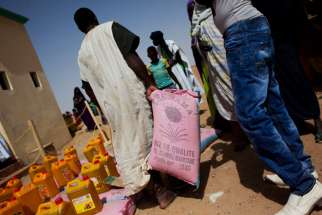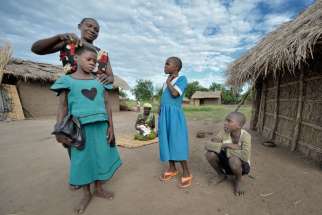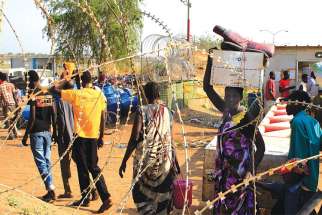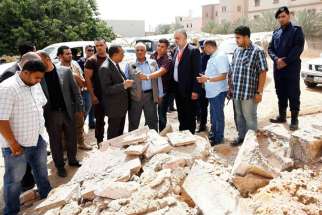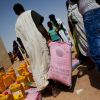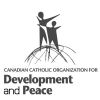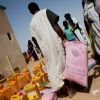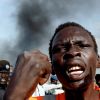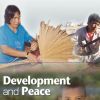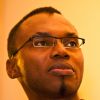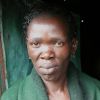Poll: Canada should act to alleviate world hunger
A third of the people in sub-Saharan Africa are chronically hungry. But, strangely, small-scale farmers, 80 per cent of them women, are the Africans most likely to come up short when trying to feed their families.
Southern Africa: AIDS has left families headed by kids, grandparents
CAPE TOWN, South Africa - With the highest levels of HIV prevalence globally, southern African countries have seen families torn apart by AIDS, with children left to raise younger siblings and sick children left in the care of elderly grandparents.
Help restore dignity to South Sudan
Islamic militias spread beyond Middle East into Africa
NAIROBI, Kenya - An Islamist group has gained ground in the northeastern Libyan city of Benghazi, declaring it an Islamic territory and raising fears that radical Islamist militias may spread in the rest of Africa.
Prominent American conservative voices are criticizing the decision to bring two medical missionaries who contracted Ebola back to the United States for treatment.
D&P raises $1.8 million for African relief
Millions of Africans have food today thanks to $1.8 million Canadian Catholics have given to their development agency.
The federal government will kick in about $1.3 million in matching funds to top up five months of fundraising by the Canadian Catholic Organization for Development and Peace.
As drought struck the six-country region in May, Development and Peace saw famine on the horizon and began raising money. By August Ottawa stepped in to announce a matching funds program. A final tally of how much of Development and Peace's Sahel region fundraising is eligible for matching funds is pending, but so far the organization has identified approximately $1.3 million that Ottawa should match.
The total Development and Peace commitment in the region comes to almost $8 million, including a $5-million food distribution program the Canadian bishops' development agency is working on with Canadian Foodgrains Bank in three Sahel countries.
In Mali, Niger, Burkina Faso, Mauritania, Chad and Senegal Development and Peace is working with longstanding partner agencies and the Caritas Internationalis network on seed and food distribution, cash-for-work programs, subsidized food sales and nutrition clinics.
The federal government matching program ended Sept. 30.
D&P extends African aid
The Canadian Catholic Organization for Development and Peace is expanding its commitment to 18 million west Africans in the Sahel region threatened with starvation.
The Catholic aid and development agency is working with Caritas Internationalis to launch food and seed distribution projects in Mauritania, Chad and Senegal to reach 300,000 people. The new projects are in addition to programs for 19,500 households in Niger, Mali and Burkina Faso. D&P is funding the Niger, Mali and Burkina Faso program along with Canadian Foodgrains Bank.
Plea goes out for African famine aid
WASHINGTON - Millions of people in West Africa’s Sahel region face severe food shortages that could be catastrophic if international aid falls short in the coming weeks, according to representatives of Catholic and other humanitarian organizations.
“The crisis is already here. People are already starving in some parts of the region,” said Bill Worms, Sahel communications officer for Caritas Internationalis in Rome.
CAPE TOWN, South Africa - Catholic and Anglican bishops in South Sudan have urged all parties to immediately implement the resolutions of a peace accord signed in early May.
"The people and government of South Sudan desperately want peace," said 14 bishops representing the Catholic and Episcopal churches of South Sudan following a May 9-11 meeting in Yei, South Sudan. They said the resolutions in the accord, signed by leaders of the six communities of Jonglei state, deal "comprehensively with many of the key issues," set deadlines and promise sanctions if they are not met.
As famine grips West Africa the Canadian Catholic Organization for Development and Peace is calling for donations so it can help its partners in the region distribute emergency food supplies and organize communities to prevent further deaths.
“This crisis has the potential to spiral into a major humanitarian catastrophe if we don’t act now,” said Development and Peace executive director Michael Casey.
TORONTO - Africans still want the kind of genuine partnership with Canadians the Canadian Catholic Organization for Development and Peace has fostered over the last four decades, the provincial superior of the Jesuits in Eastern Africa said — even if CIDA has cancelled funding to every D&P partner in Africa outside of the Democratic Republic of Congo.
"It matters," Fr. Agbonkhianmeghe Orobator told The Catholic Register. "It's not only about Canadians giving to Africa. There's an element of mutuality there. It's not just about the money. It is important to keep that contact."
NAIROBI, Kenya - The year 2011 was not good for women such as Joan Ochieng. Just about everything was a struggle.
"We were not treated fairly," the Nairobi resident and single mother said of life in 2011, noting the many pressures, including spiraling food prices that caused her and her family of four children and one grandchild to often go to bed hungry.
When things like rice doubled in price in six months, a bowl of porridge was often the only salve in a day in which eating three meals was almost unheard of. Even eating two meals was often a rarity.
Ghanian church aims to keep the peace
WINDSOR, Ont. - Ghana’s first cardinal said the church will be playing a role in upcoming elections in his country, seeking to maintain stability in what generally has been one of West Africa’s most peaceful and economically developed countries.
Cardinal Peter (Kodwo Appiah) Turkson told a news conference here that despite recent years of good governance under a parliamentary system “we have in the back of our minds what happened in Kenya” last December and January when rioting broke out and people died over disputed presidential election results.
“The tribal differences and the possibility of political groups making use of the tribal differences among us, that’s also there,” he said. “We want to ensure that nothing like that happens.”
He said the church will be contributing monitors to ensure the elections “are free and fair.” The country’s first election was held in 1992 and the subsequent political evolution has shown the country has “made some headway.” He said “it’s that hope that we can transfer some of these experiences to our neighbouring countries.”
Otherwise, Turkson said, the country is “peaceful politically (and) economically very viable.” Catholics make up about 18 per cent of Ghana’s Christian population. The overall population is 23 million.
Turkson was in Windsor after participating in the 49th International Eucharistic Congress in Quebec City in mid-June. He came after pledging to visit local Rotarians because of their help in rebuilding schools and medical clinics in his region.
A group called RELAY (Rotarians Enhancing Learning of African Youth) has made three trips to the area since 2005. It also has done similar work in Kenya and is headed to northern Ethiopia next year. Since starting with a $10,000 project it has raised more than $250,000.
Turkson, 59, was proclaimed cardinal by Pope John Paul II in 2003. He was ordained in 1975 and has a doctorate in sacred Scripture from the Pontifical Biblical Institute in Rome.
Turkson has spoken out strongly in Ghana in favour of political cohesion, stressing the importance for Catholics to read and understand the Koran, for example. Muslims make up 16 per cent of the population. He also called on his nation’s government to fulfill a promise to provide identity cards to all citizens as a “basic instrument for democracy” that would assist in planning for the country’s welfare.
Turkson said that while Ghana is moving forward on several fronts the country still requires substantial assistance. Commenting on the amount of technology he saw in Windsor’s hospitals, he said cases that would probably lead to death in Ghana may not necessarily do so here, “so the difference is huge.”
The RELAY group was formed by husband and wife Michael and Shelly Duben. Michael’s mother was from the Ghanian town of Anomabo. After her death he wanted to visit the town “to just have a look at what her community was like. And because we’re Rotarians we decided to do a project there.”
Duben suggested Turkson is someone to watch in the church.
“There’s been a lot of discussion about the next pope potentially coming out of Africa,” he said. “He is fairly young and he’s one of those individuals who’s just an engaging speaker. Whether young or old he gets the message across. And that’s what we really like about him.”
(Stang is a freelance writer in Windsor, Ont.)


